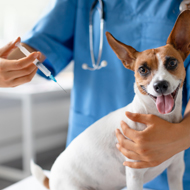Dogs have a positive impact on working groups, study finds

The presence of a dog can increase kind and helpful behaviour in work groups.
A study by US researchers has found that the presence of a dog can increase kind and helpful behaviour in work groups.
Published in the journal Anthrozoos, the study adds to a growing body of research that suggests dogs have a positive effect on mood and social interaction.
“When people work in teams, the presence of a dog seems to act as a social lubricant,” explains lead author Steve Colarelli, speaking to Greater Good. “Dogs seem to be beneficial to the social interactions of teams.”
In the study, researchers from the University of Michigan gave small groups tasks to complete both with and without a dog present in the room.
In the first task, participants were asked to produce a 15-second advert and slogan for a fictional project - an exercise that requires cooperation. In the second task, the groups played a modified version of the prisoner’s dilemma game, in which players have to decide whether to cooperate with one another or look after themselves.
After the groups completed the tasks, participants reported on how satisfied they felt with the group and how much they tested group members. Independent raters also analysed video footage of the tasks, looking out for signs of cooperation, bonding and expressions of vulnerability that show trust.
The researchers found that groups with dogs displayed more verbal and physical signs of closeness than groups without a dog, regardless of the task. The independent raters observed more signs of cooperation during the first task and group members said they trusted each other more during task two if there was a dog in the room.
Furthermore, when the independent raters watched the task videos without any sound, they noticed more good feelings in groups with a dog in the room, than in groups without a dog.
While the dogs did not seem to affect the participants’ performance during the tasks, the authors believe that the observed social and emotional benefits could have a positive impact on groups over time.
“In a situation where people are working together for a long period of time, and how well the team gets along—do they speak together, have rapport, act cooperatively, help one another—could influence the outcome of the team, then I suspect a dog would have a positive impact,” Colarelli concludes.



 RUMA CA&E has extended the deadline for its online survey into vaccine availability.
RUMA CA&E has extended the deadline for its online survey into vaccine availability.